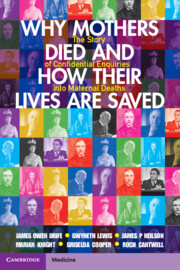 Why Mothers Died and How their Lives are Saved
Why Mothers Died and How their Lives are Saved Published online by Cambridge University Press: 05 April 2023
In South Africa in the 1990s Prof. Robert Pattinson asked the minister of health to establish a CEMD based on the UK model. The first Report appeared in 1998. During the AIDS epidemic the president and officials were denialists and tried to alter the Reports. The Enquiry developed a system to report 'great saves'. Politicians were supportive and maternal mortality fell to 97/100,000 in 2019. In India, Dr VP Paily is the coordinator of Kerala’s Confidential Review of Maternal Deaths. The KFOG was founded in 2002 and the Review began in 2003, stimulated by the WHO. The government authorised hospitals to give the KFOG anonymised records of maternal deaths. Quality standards were developed, helped by NICE International. In 2019 the maternal mortality rate was 28/100,000. In the USA Prof. Elliott Main is the medical director of the California Maternal Quality Care Collaborative (CMQCC), established when mortality rose in the 2000s. It produced toolkits to tackle the leading causes and in 2012 established the Maternal Data Center, combining social and hospital data. Severe maternal morbidity is scrutinised. Mortality fell and similar initiatives have spread across the USA.
To save this book to your Kindle, first ensure [email protected] is added to your Approved Personal Document E-mail List under your Personal Document Settings on the Manage Your Content and Devices page of your Amazon account. Then enter the ‘name’ part of your Kindle email address below. Find out more about saving to your Kindle.
Note you can select to save to either the @free.kindle.com or @kindle.com variations. ‘@free.kindle.com’ emails are free but can only be saved to your device when it is connected to wi-fi. ‘@kindle.com’ emails can be delivered even when you are not connected to wi-fi, but note that service fees apply.
Find out more about the Kindle Personal Document Service.
To save content items to your account, please confirm that you agree to abide by our usage policies. If this is the first time you use this feature, you will be asked to authorise Cambridge Core to connect with your account. Find out more about saving content to Dropbox.
To save content items to your account, please confirm that you agree to abide by our usage policies. If this is the first time you use this feature, you will be asked to authorise Cambridge Core to connect with your account. Find out more about saving content to Google Drive.